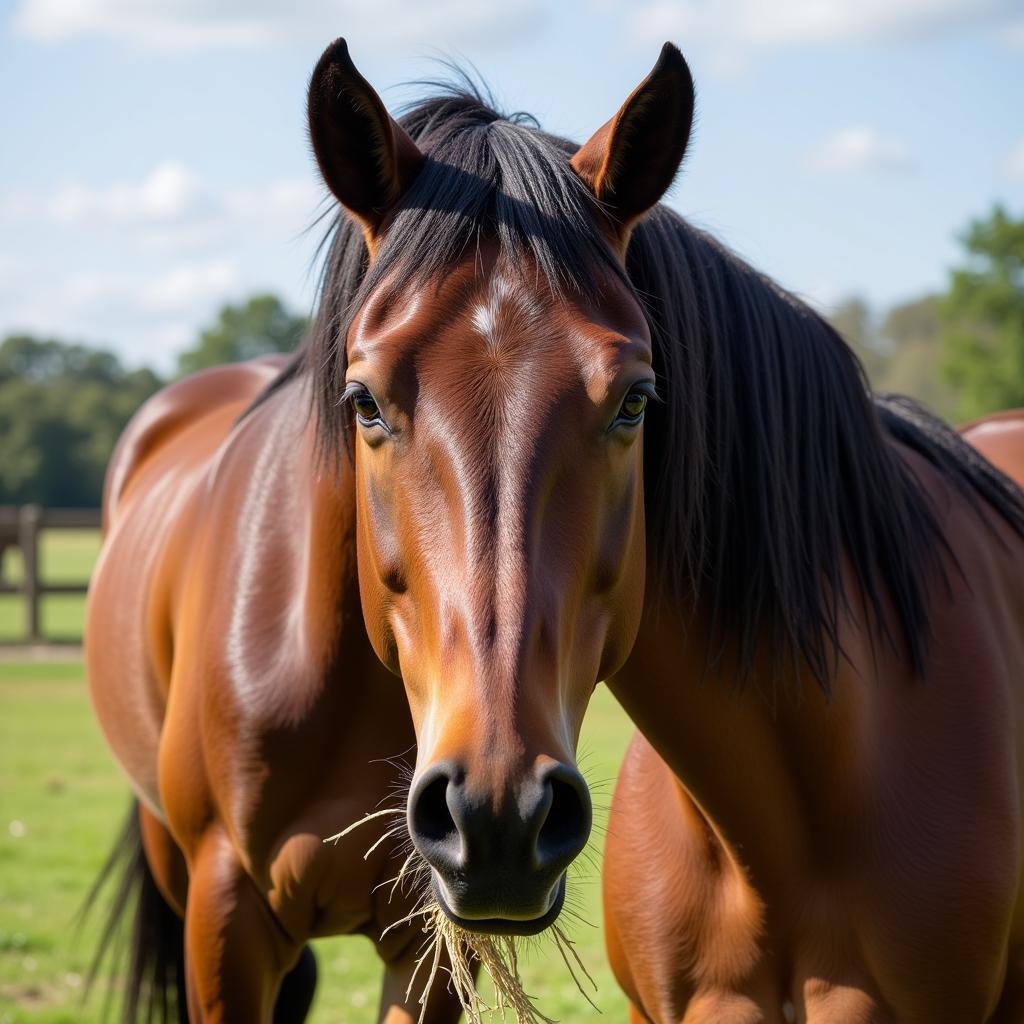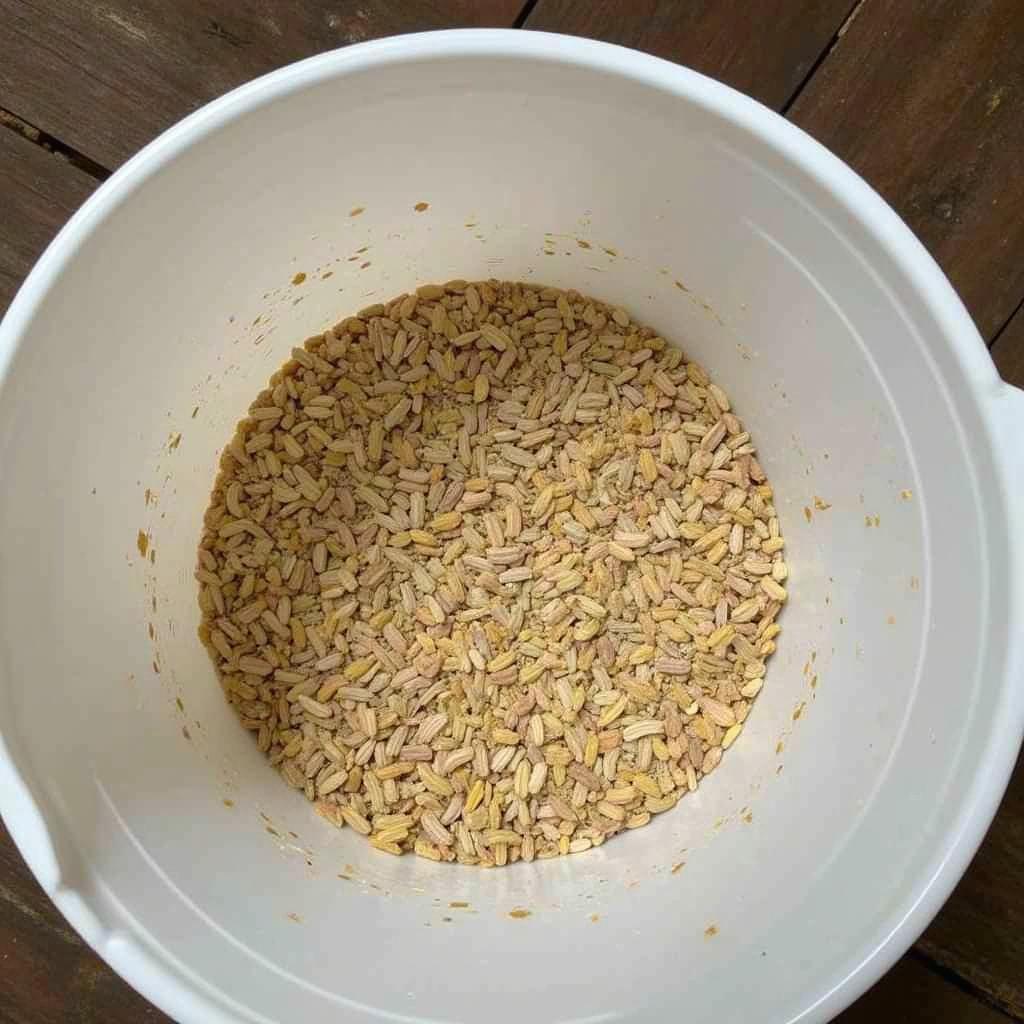Prebiotics For Horses are a crucial part of maintaining their digestive health. These non-digestible fiber supplements feed the beneficial bacteria in your horse’s gut, promoting a balanced microbiome and overall well-being. Understanding the role of prebiotics can significantly impact your horse’s health, from improved nutrient absorption to enhanced immune function.
Understanding the Importance of Prebiotics for Horses
Equine digestive health is complex, and prebiotics play a vital role in supporting it. Unlike probiotics, which introduce live beneficial bacteria, prebiotics act as a food source for the existing good bacteria in the hindgut. This allows the beneficial bacteria to flourish, creating a more robust and balanced gut environment. This balance is essential for optimal digestion and nutrient absorption. A healthy hindgut also contributes to a stronger immune system, as a significant portion of the horse’s immune defenses reside within the gut.
Just after this introductory section, learn more about the benefits of combining pre and probiotics for your equine companion on our dedicated page: pre probiotics for horses.
How Prebiotics Benefit Your Horse’s Health
Prebiotics offer a multitude of benefits for horses, contributing to both their physical and mental well-being. By fostering a healthy gut microbiome, prebiotics improve nutrient absorption, allowing your horse to extract maximum value from their feed. This can lead to improved coat condition, increased energy levels, and better overall performance. Moreover, a balanced gut contributes to a stronger immune system, making the horse less susceptible to illnesses. Prebiotics can also aid in reducing the risk of digestive upsets, such as colic and diarrhea.
 Horse eating hay with improved coat condition after prebiotic supplementation
Horse eating hay with improved coat condition after prebiotic supplementation
Choosing the Right Prebiotics for Your Horse
Selecting the appropriate prebiotics for your horse requires careful consideration. Different types of prebiotics exist, each with unique properties and benefits. Common prebiotics for horses include fructo-oligosaccharides (FOS), mannan-oligosaccharides (MOS), and beet pulp. When choosing a prebiotic supplement, it’s essential to consider your horse’s individual needs, age, and current health status. Consulting with a veterinarian or equine nutritionist can help you determine the most suitable prebiotic supplement for your horse. Looking for the best options? Check out our guide on the best pro and prebiotics for horses.
Incorporating Prebiotics into Your Horse’s Diet
Adding prebiotics to your horse’s diet should be done gradually to allow the gut microbiome to adjust. Start with a small amount and slowly increase the dosage over several weeks. It’s crucial to monitor your horse for any changes in their digestive system, such as loose stools or gas. Prebiotics are typically available in powder or pellet form and can be easily mixed with your horse’s regular feed. Ensure your horse has access to plenty of fresh water to support optimal digestion. For more information on general equine supplements, explore our page on the best supplement for horses.
 Horse feed mixed with prebiotic supplement
Horse feed mixed with prebiotic supplement
Why are prebiotics important for horses?
Prebiotics are crucial for maintaining a healthy balance of gut bacteria in horses, which supports digestion, nutrient absorption, and immune function.
What are some common prebiotic sources for horses?
Common prebiotic sources include beet pulp, FOS, and MOS, often found in specialized equine supplements. Learn more about probiotics specifically designed for horses on our probiotics horses page.
“Prebiotics are not a quick fix, but a long-term investment in your horse’s digestive health,” says Dr. Emily Carter, DVM, specializing in equine nutrition. “Consistent use can lead to significant improvements in overall well-being.”
Are prebiotics necessary for all horses?
While not strictly necessary for every horse, prebiotics can be particularly beneficial for horses with digestive issues, those undergoing antibiotic treatment, or older horses. Explore tailored solutions for your senior horse on our supplements for older horses page.
 Veterinarian examining a horse's digestive system
Veterinarian examining a horse's digestive system
How long does it take to see results from prebiotics?
The effects of prebiotics can vary, but noticeable improvements in digestion and overall health are often observed within a few weeks of consistent supplementation.
“Remember, a healthy gut is the foundation of a healthy horse,” adds Dr. Carter. “By incorporating prebiotics into your horse’s diet, you’re supporting their digestive system and promoting their overall well-being.”
Conclusion
Prebiotics for horses are an essential component of a balanced nutritional program, promoting a healthy gut and contributing to overall well-being. By understanding the crucial role prebiotics play, horse owners can take proactive steps towards ensuring their equine companions thrive.
FAQ
- What is the difference between prebiotics and probiotics?
- How do I choose the best prebiotic for my horse?
- Can I give my horse too much prebiotics?
- Are there any side effects of prebiotics in horses?
- How do I store prebiotic supplements?
- Can I give prebiotics to pregnant mares?
- How do I know if prebiotics are working for my horse?
For any assistance, please contact us: Phone: 0772127271, Email: [email protected] or visit us at QGM2+WX2, Vị Trung, Vị Thuỷ, Hậu Giang, Việt Nam. We have a 24/7 customer service team.